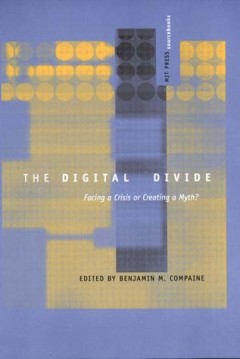Filter by

The information resources policy handbook : research for the Information Age
To understand the Information Age one must understand the concept of information as a resource. Like other basic resources, such as energy and materials, information resources are building blocks of society. But unlike energy and materials, they are far more abundant and versatile. Information resources include computers, telecommunications, the mass media, and financial services, all created o…
- Edition
- -
- ISBN/ISSN
- 0585070156
- Collation
- 1 online resource (xxviii, 631 pages) : illustrations
- Series Title
- -
- Call Number
- 005 INF

The Internet upheaval : raising questions, seeking answers in communications …
"At the beginning of 2000, the U.S. economy was enjoying the longest period of sustained growth and economic prosperity in its history. According to The Internet Upheaval, part of the explanation for this phenomenon is a consequence of how information technologies, in particular the Internet, are upending fundamental economic and social structures.These research studies explore some of the tele…
- Edition
- -
- ISBN/ISSN
- 0262285606
- Collation
- 1 online resource (xxix, 426 pages) : illustrations
- Series Title
- -
- Call Number
- 001 INT

The Digital Divide: Facing a Crisis or Creating a Myth?
Annotation The Digital Divide refers to the perceived gap between those who have access to the latest information technologies and those who do not. If we are indeed in an Information Age, then not having access to this information is an economic and social handicap. Some people consider the Digital Divide to be a national crisis, while others consider it an over-hyped nonissue. This book prese…
- Edition
- -
- ISBN/ISSN
- 9780262287029
- Collation
- -
- Series Title
- -
- Call Number
- -

Communications policy in transition :the Internet and beyond
Papers from the 28th Telecommunications Policy Research Conference held in Alexandria, Va. in the Fall of 2000.Until the 1980s, it was presumed that technical change in most communications services could easily be monitored from centralized state and federal agencies. This presumption was long outdated prior to the commercialization of the Internet. With the Internet, the long-forecast converge…
- Edition
- -
- ISBN/ISSN
- 9780262270717
- Collation
- 1 online resource (xxii, 425 pages) :illustrations
- Series Title
- -
- Call Number
- -
 Computer Science, Information & General Works
Computer Science, Information & General Works  Philosophy & Psychology
Philosophy & Psychology  Religion
Religion  Social Sciences
Social Sciences  Language
Language  Pure Science
Pure Science  Applied Sciences
Applied Sciences  Art & Recreation
Art & Recreation  Literature
Literature  History & Geography
History & Geography